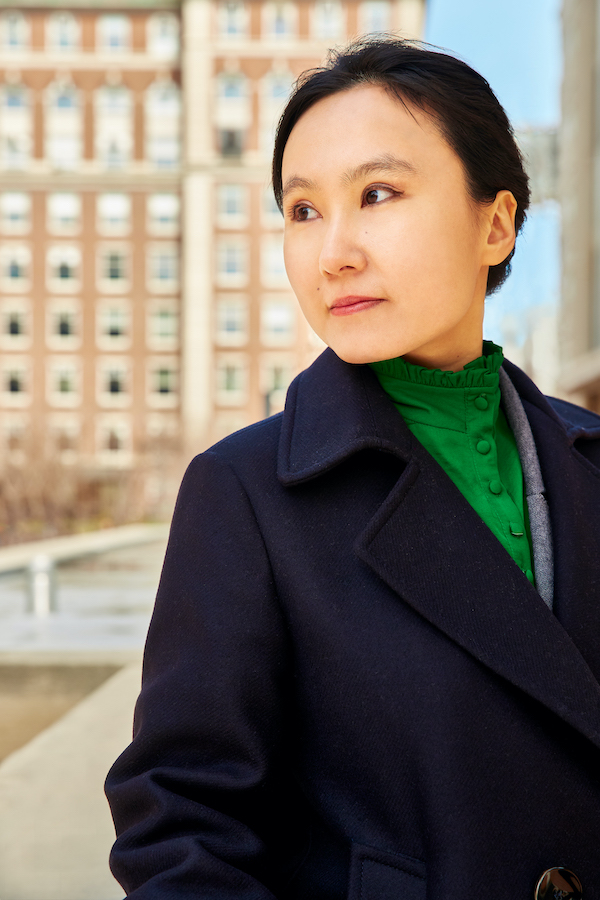Talea Ensemble offers two premieres, better living through sound chemistry

Music can be “about” all sorts of things, from philosophy to psychology to politics. But sometimes it’s just about the sheer mystery of tones propagating through thin air.
Such was the case during much of Talea Ensemble’s concert Saturday night at the DiMenna Center for Classical Music. Although titled “Strange Tales,” the program of new and recent works—including the world premiere of Wang Lu’s November Airs—didn’t so much tell stories as transport the listener into wholly unfamiliar soundscapes.
The godfathers of such experiments in sound chemistry range from Debussy to Alvin Lucier, who died this month at age 90. Lucier’s 1993 work Music for Cello with One or More Amplified Glass Vases was added to Saturday’s program in tribute.
As the program began, four plump vases in clear glass (fashioned by glass artist Jocelyne Prince) sat on the floor in front of cellist Christopher Gross, each with a microphone inside it. Gross’s role was to stroke long notes from his instrument, beginning in its deepest range and progressing upward, while sound engineer Sam Torres captured and amplified the multitude of resonances and harmonics emitted by the vases in response.
Unearthly chords coalesced and vanished. Acoustic “beats,” produced by sound wave interference, throbbed lazily or pulsated almost too fast to hear. The sensation was of walking through a garden of sound, with new colors and fragrances at every turn in the path.
This vivid electro-acoustic performance set the table for Primavera Crown, a colorful, acoustic 2020 piece for 14 players by inti figgis-vizueta. Conductor James Baker led a crisp, lively performance that danced with guitar and percussion effects in the strings and microtonal beats in the winds. Clashing rhythms and whistling string harmonics hinted at the composer’s Andean and Irish heritage, but her fertile imagination for instrumental combinations and advanced playing techniques transformed any local references into uncharted territory.
In brief interviews with Talea’s violist Hannah Levinson after the intermission, the evening’s two living composers and visual artist Polly Apfelbaum commented on their work. Composer figgis-vizueta cited her need to make a “clear structure” in which things could “happen accidentally.”
Wang Lu described the “dramatic storytelling” of the literary classic Strange Tales of a Chinese Studio, but said it was more the work’s poetic and natural imagery that inspired her as she composed. She and Apfelbaum collaborated at a distance during the pandemic, as the latter developed the “two bowls” visuals for the new piece.
And in fact, Wu’s November Airs—commissioned for Talea Ensemble by the Fromm Foundation—opened with projected video of a large, ivory-colored bowl, viewed vertically, slowly rotating as if still on the potter’s wheel. At intervals as the piece progressed, a hand was seen gently placing a small bowl inside the larger one, then replacing it with a series of similar bowls in different colors. The video became a rotating object of meditation, though with real-world associations: an eye, for example, when the small bowl was blue, or an egg when it was orange.
Lu’s music, for seven players conducted by Baker, began in a thin wash of string harmonics punctuated by notes struck or plucked on the piano, and explored mostly quiet and attenuated textures thereafter. Toneless sounds on wind instruments suggested a passing breeze. An alto flute trilled like a distant bird. An occasional soft stroke on the large gong or bass drum kept it all grounded, and the cello led more songful episodes near the end.
Surprisingly, and charmingly, this evanescent piece concluded with a chattering crescendo for the whole ensemble, putting a festive cap on a notable world premiere and an evening rich in sonic imagination by composers and performers alike.






